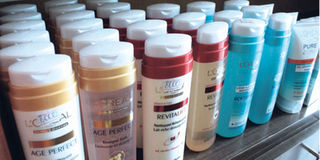French firm to stir beauty products sector as it acquires Nice & Lovely

Some beauty products by French firm L’Oreal. The company is set to acquire part of Interconsumer Products Ltd, the makers of Nice & Lovely. Photo/FILE
What you need to know:
- The Kenya Economic Survey 2012 indicates that Kenya imported essential oils and perfumes worth Sh13.5 billion in 2011. The former are used in the manufacture of cosmetics and soaps.
The gloves are off in the fight for a giant share of Kenya’s multi-billion shilling beauty industry as French multinational acquires part of the company that owns Nice & Lovely.
In a notice published in the Kenya Gazette yesterday, the Competition Authority of Kenya gave its nod to a planned acquisition of Interconsumer Products Limited’s beauty and health business by L’Oreal East Africa — the makers of Dark and Lovely hair care products.
“The competition Authority authorises the acquisition of the health and beauty business of Interconsumer Products Limited by L’Oreal East Africa Limited,” reads the notice in part.
Although Saturday Nation could not establish the value of the deal, it is undoubtedly significant given the financial clout of L’Oreal as well as the local market share of Interconsumer Products.
Data released by research firm Consumer Insight Africa (CIA) earlier this year indicated that Interconsumer’s flagship brand, Nice & Lovely, was the market leader in the hair care business controlling about 18 per cent of the industry. Additionally, Interconsumer has a presence in Uganda, Tanzania and Rwanda following an expansion drive rolled out in 2002.
Through the deal, L’Oreal will be consolidating its presence in Kenya in the face of cutthroat competition from both multinational and home-grown companies. L’Oreal launched the East African subsidiary in 2011.
It is not the only multinational cosmetics company that has sought to set up shop locally. Over the last three years, New York listed Estee Lauder and Swedish Oriflame have expanded into East Africa setting up shop in Kenya.
In February, American skin care giant, Revlon, made a foray into the Kenyan market through a Sh87 million ($1 million) franchise deal with Nakumatt.
“Given the highly lucrative nature of this category, we can be sure that the competition for market-share will not be pretty,” said Consumer Insight Africa.
Research commissioned by beauty products firm Oriflame in 2011 revealed that Kenyans spend at least Sh5 billion per month on beauty products, including soaps, cosmetics, fragrances, skin care and oral care products. Sh500 million of this was spent on hair care alone.
The Kenya Economic Survey 2012 indicates that Kenya imported essential oils and perfumes worth Sh13.5 billion in 2011. The former are used in the manufacture of cosmetics and soaps.
Consumer Insight also found that only 38 per cent of women and 26 per cent of men were willing to buy alternative beauty products with lower pricing despite economic hardships.
“Even in these tough economic times, women have given cosmetics salesmen a reason to be happy. Or so it would seem,” said the research firm.
L’Oreal is has consolidated a strategy that it has pursued over the last decade targeting alternative beauty markets.
In 2000, L’Oreal purchased SoftSheen Carson, which developed products targeted at African people and in the process acquiring the Dark and Lovely brand.
Last year, L’Oreal reported a Sh324.8 billion ($3.84 billion) profit boosted by earnings from emerging markets.




